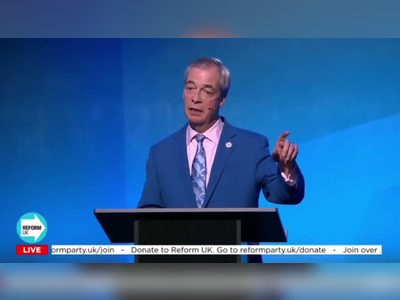Irish Rugby Players' Rape Conviction Ignites Broader Debate on Justice
The case has raised discussions in France about legal proceedings, societal attitudes, and the responsibilities of institutions in cases of sexual violence.
The seven women and a solitary man who stood outside the courthouse in Bordeaux didn’t know the woman who’d brought charges against the five rugby players, but they had a simple message for her and other survivors of rape: “We believe you.”
Nearly eight years after reporting her ordeal to police, the victim sat just metres from Denis Coulson and two others as they were convicted of her gang rape, and sentenced to between 12 and 14 years in prison.
She kissed and hugged those close to her, including her legal team, before slipping out of the courtroom to spend the weekend in Bayonne with her mother, sister and boyfriend.
“She needed to decompress,” said Grégoire Mouly, one of the victim’s four lawyers.
“It was intense and emotional, and she wants time now with her family to process it.
She is relieved, she knows she didn’t go through all of this for nothing, but this is not the end.
There is a civil case pending, and there will be an appeal.
We will have to go through this again.”
Lawyers for the defendants have 10 days to file an appeal, and had immediately let it be known that they intended to do so.
Such an application may be limited to the duration of the sentences, without guilt being contested.
If the appeal is granted, the court will re-examine and re-try the entire case, before either confirming or reversing the original judgment.
People outside the courthouse in Bordeaux show their support for the woman raped by rugby players.
Coulson, a former Ireland U20 international, was convicted of gang rape, along with Frenchman Loïck Jammes and New Zealander Rory Grice.
Two others, former Munster player Chris Farrell and New Zealander Dylan Hayes, were found guilty of failing to prevent the crime.
Farrell was sentenced to four years, with two years suspended and the other two to be served under electronic tagging.
Hayes got a two-year suspended sentence.
It means neither faces jail time.
The victim told police she’d met the players during a night out in Bordeaux in March 2017.
Their club, FC Grenoble, had just lost a match to local rugby side Bordeaux-Bègles.
She said she’d had so much to drink that she couldn’t remember anything between leaving the nightclub and waking up in a hotel room in Mérignac, on the outskirts of the city, surrounded by several naked men.
The woman, who was a student at the time, reported the incident to police within hours of leaving the hotel.
Coulson, Jammes and Grice were twice questioned by police, and placed under formal investigation a month later.
They were charged and sent to trial in June 2019, but appealed the decision.
Irish rugby player Chris Farrell was found guilty of failing to prevent a crime.
Photograph: Romain Perrocheau/AFP via Getty Images
The application was ultimately rejected, but during the course of its investigation, the appeals court had requested supplementary information.
There was legal wrangling over access to several video recordings that ended up incriminating Farrell and Hayes, who were subsequently charged, in September 2022, with failing to prevent the gang rape of the victim, and sent forward for trial.
A further legal appeal was filed within days of this decision, this time involving all five players, who went to France’s highest court, the court of cessation, in the hope of annulling the decision to have them tried.
They lost the appeal and a trial date was set for June this year.
But proceedings were again delayed when Coulson was involved in a serious car crash just days before the trial was due to begin.
Within hours of the final decision to send the players to trial, Munster Rugby confirmed that it was releasing Farrell from his involvement with the province while legal proceedings continued.
He moved to France, where he joined Division Two club Oyonnax, where he is still listed on their website as a centre.
Grice, a forward, is still listed there too, despite his 12-year sentence.
In a brief statement at the weekend, the club said it had “taken note of the judgment” concerning the two players, and would make a decision about their future with the side “in the coming days”.
Loïck Jammes was sentenced to 14 years for rape.
Photograph: Romain Perrocheau/AFP via Getty Images
Provence Rugby club issued a similar statement regarding hooker Jammes – sentenced to 14 years – saying that it “respected the possibility of appeal” and “reserved the right to make additional decisions based on future legal developments”.
He, too, remains listed as a player.
For Anne Bouillon, a lawyer specialising in women’s rights and domestic violence, it’s a symptom of a wider malaise.
“Even after perpetrators are convicted in this country, there is a tendency towards impunity, an idea that these men can somehow share responsibility for what happened with their victim, share the blame with her.
Even the fact that it took so long for this case to come to trial, that’s an extremely difficult situation for the victim, who would have been questioned about her behaviour and character and whether she had consented to this crime.”
In advance of the trial, some French media outlets had criticised the clubs for not sanctioning players who had been charged with serious crimes, and pointing to the example set by Munster and the IRFU.
The president of Oyonnax, Dougal Bendjaballah, went as far as to offer his “total support” to Grice last February, saying he would be “protected whatever happens”.
Grice is now incarcerated in one of France’s most overpopulated prisons, Bordeaux-Gradignan, transported there by police officers who had arrived at the courthouse on Friday afternoon before the sentences were handed down.
Under French law, defendants remain in prison pending appeal, but lawyers can request their release.
“We are going to ask that he be freed,” said Coulson’s lawyer, Corinne Dreyfus-Schmidt.
“Jailing a man for 14 years for something that he is accused of doing eight years ago, we did not expect this.
What benefit is there in imposing such a severe sentence?
None, apart from destroying another life.
This sentence is absolutely disproportionate, unreasonable and shocking.”
Campaigners who work with survivors of abuse say she is mistaken.
“The sentence is too harsh?
That’s not what the law says,” says Elsa Labouret, spokesperson for the feminist association Osez le Féminisme.
“These men targeted a vulnerable woman.
They are a danger to society.
The victim was extremely intoxicated, she had been drinking to the point of passing out.
She was not in a position to say ‘no’.
The perpetrators in cases like this are not monsters or psychopaths, they are ordinary men.
It’s not about class, nationality or profession, and this issue isn’t exclusive to the sports or film and music industries.
The only common denominator is violence against women.
If you are going to be dangerous when drunk, don’t drink.”
Nearly eight years after reporting her ordeal to police, the victim sat just metres from Denis Coulson and two others as they were convicted of her gang rape, and sentenced to between 12 and 14 years in prison.
She kissed and hugged those close to her, including her legal team, before slipping out of the courtroom to spend the weekend in Bayonne with her mother, sister and boyfriend.
“She needed to decompress,” said Grégoire Mouly, one of the victim’s four lawyers.
“It was intense and emotional, and she wants time now with her family to process it.
She is relieved, she knows she didn’t go through all of this for nothing, but this is not the end.
There is a civil case pending, and there will be an appeal.
We will have to go through this again.”
Lawyers for the defendants have 10 days to file an appeal, and had immediately let it be known that they intended to do so.
Such an application may be limited to the duration of the sentences, without guilt being contested.
If the appeal is granted, the court will re-examine and re-try the entire case, before either confirming or reversing the original judgment.
People outside the courthouse in Bordeaux show their support for the woman raped by rugby players.
Coulson, a former Ireland U20 international, was convicted of gang rape, along with Frenchman Loïck Jammes and New Zealander Rory Grice.
Two others, former Munster player Chris Farrell and New Zealander Dylan Hayes, were found guilty of failing to prevent the crime.
Farrell was sentenced to four years, with two years suspended and the other two to be served under electronic tagging.
Hayes got a two-year suspended sentence.
It means neither faces jail time.
The victim told police she’d met the players during a night out in Bordeaux in March 2017.
Their club, FC Grenoble, had just lost a match to local rugby side Bordeaux-Bègles.
She said she’d had so much to drink that she couldn’t remember anything between leaving the nightclub and waking up in a hotel room in Mérignac, on the outskirts of the city, surrounded by several naked men.
The woman, who was a student at the time, reported the incident to police within hours of leaving the hotel.
Coulson, Jammes and Grice were twice questioned by police, and placed under formal investigation a month later.
They were charged and sent to trial in June 2019, but appealed the decision.
Irish rugby player Chris Farrell was found guilty of failing to prevent a crime.
Photograph: Romain Perrocheau/AFP via Getty Images
The application was ultimately rejected, but during the course of its investigation, the appeals court had requested supplementary information.
There was legal wrangling over access to several video recordings that ended up incriminating Farrell and Hayes, who were subsequently charged, in September 2022, with failing to prevent the gang rape of the victim, and sent forward for trial.
A further legal appeal was filed within days of this decision, this time involving all five players, who went to France’s highest court, the court of cessation, in the hope of annulling the decision to have them tried.
They lost the appeal and a trial date was set for June this year.
But proceedings were again delayed when Coulson was involved in a serious car crash just days before the trial was due to begin.
Within hours of the final decision to send the players to trial, Munster Rugby confirmed that it was releasing Farrell from his involvement with the province while legal proceedings continued.
He moved to France, where he joined Division Two club Oyonnax, where he is still listed on their website as a centre.
Grice, a forward, is still listed there too, despite his 12-year sentence.
In a brief statement at the weekend, the club said it had “taken note of the judgment” concerning the two players, and would make a decision about their future with the side “in the coming days”.
Loïck Jammes was sentenced to 14 years for rape.
Photograph: Romain Perrocheau/AFP via Getty Images
Provence Rugby club issued a similar statement regarding hooker Jammes – sentenced to 14 years – saying that it “respected the possibility of appeal” and “reserved the right to make additional decisions based on future legal developments”.
He, too, remains listed as a player.
For Anne Bouillon, a lawyer specialising in women’s rights and domestic violence, it’s a symptom of a wider malaise.
“Even after perpetrators are convicted in this country, there is a tendency towards impunity, an idea that these men can somehow share responsibility for what happened with their victim, share the blame with her.
Even the fact that it took so long for this case to come to trial, that’s an extremely difficult situation for the victim, who would have been questioned about her behaviour and character and whether she had consented to this crime.”
In advance of the trial, some French media outlets had criticised the clubs for not sanctioning players who had been charged with serious crimes, and pointing to the example set by Munster and the IRFU.
The president of Oyonnax, Dougal Bendjaballah, went as far as to offer his “total support” to Grice last February, saying he would be “protected whatever happens”.
Grice is now incarcerated in one of France’s most overpopulated prisons, Bordeaux-Gradignan, transported there by police officers who had arrived at the courthouse on Friday afternoon before the sentences were handed down.
Under French law, defendants remain in prison pending appeal, but lawyers can request their release.
“We are going to ask that he be freed,” said Coulson’s lawyer, Corinne Dreyfus-Schmidt.
“Jailing a man for 14 years for something that he is accused of doing eight years ago, we did not expect this.
What benefit is there in imposing such a severe sentence?
None, apart from destroying another life.
This sentence is absolutely disproportionate, unreasonable and shocking.”
Campaigners who work with survivors of abuse say she is mistaken.
“The sentence is too harsh?
That’s not what the law says,” says Elsa Labouret, spokesperson for the feminist association Osez le Féminisme.
“These men targeted a vulnerable woman.
They are a danger to society.
The victim was extremely intoxicated, she had been drinking to the point of passing out.
She was not in a position to say ‘no’.
The perpetrators in cases like this are not monsters or psychopaths, they are ordinary men.
It’s not about class, nationality or profession, and this issue isn’t exclusive to the sports or film and music industries.
The only common denominator is violence against women.
If you are going to be dangerous when drunk, don’t drink.”











